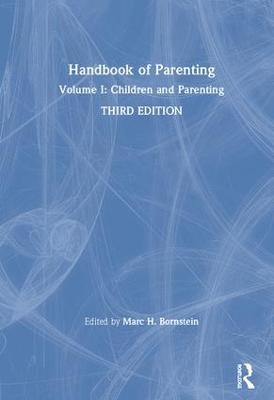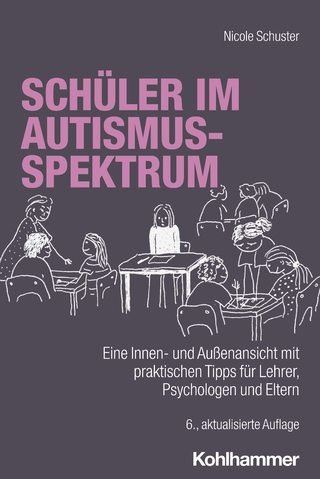
Handbook of Parenting
Routledge (Verlag)
978-1-138-22865-8 (ISBN)
This highly anticipated third edition of the Handbook of Parenting brings together an array of field-leading experts who have worked in different ways toward understanding the many diverse aspects of parenting. Contributors to the Handbook look to the most recent research and thinking to shed light on topics every parent, professional, and policymaker wonders about. Parenting is a perennially "hot" topic. After all, everyone who has ever lived has been parented, and the vast majority of people become parents themselves. No wonder bookstores house shelves of "how-to" parenting books and magazine racks in pharmacies and airports overflow with periodicals that feature parenting advice. However, almost none of these is evidence-based. The Handbook of Parenting is. Period. Each chapter has been written to be read and absorbed in a single sitting, and includes historical considerations of the topic, a discussion of central issues and theory, a review of classical and modern research, and forecasts of future directions of theory and research. Together, the five volumes in the Handbook cover Children and Parenting, the Biology and Ecology of Parenting, Being and Becoming a Parent, Social Conditions and Applied Parenting, and the Practice of Parenting.
Volume 1, Children and Parenting, considers parenthood as a functional status in the life cycle: Parents protect, nurture, and teach their progeny, even if human development is more dynamic than can be determined by parental caregiving alone. Volume 1 of the Handbook of Parenting begins with chapters concerned with how children influence parenting. Notable are their more obvious characteristics, like child age or developmental stage; but subtler ones, like child gender, physical state, temperament, mental ability, and other individual-differences factors, are also instrumental. The chapters in Part I, on Parenting across the Lifespan, discuss the unique rewards and special demands of parenting children of different ages and stages – infants, toddlers, youngsters in middle childhood, and adolescents—as well as the modern notion of parent-child relationships in emerging adulthood, adulthood, and old age. The chapters in Part II, on Parenting Children of Varying Status, discuss common issues associated with parenting children of different genders and temperaments as well as unique situations of parenting adopted and foster children and children with a variety of special needs, such as those with extreme talent, born preterm, who are socially withdrawn or aggressive, or who fall on the autistic spectrum, manifest intellectual disabilities, or suffer a chronic health condition.
Marc H. Bornstein is Senior Investigator, Head of Child and Family Research, and Head of the Imaging and Behavioral Determinants of Development Affinity Group at the Eunice Kennedy Shriver National Institute of Child Health and Human Development.
Part I. Parenting Across the Lifespan 1. Parenting Infants Marc H. Bornstein 2. Parenting Toddlers Marjolein Verhoeven, Anneloes van Baar, and Maja Deković 3. Parenting During Middle Childhood W. Andrew Collins and Stephanie D. Madsen 4. Parenting Adolescents Bart Soenens, Maarten Vansteenkiste, and Wim Beyers 5. Parenting Emerging Adults Laura M. Padilla-Walker and Larry J. Nelson 6. Parent-Child Relationships in Adulthood and Old Age Karen L. Fingerman, Steven H. Zarit, and Kira S. Birditt Part II. Parenting Children of Varying Status 7. Parenting Siblings Mark E. Feinberg, Susan M. McHale, and Shawn D. Whiteman 8. Parenting Girls and Boys Christia Spears Brown and Michelle Tam 9. Parenting and Temperament John E. Bates, Maureen E. McQuillan, and Caroline P. Hoyniak 10. Parenting in Adoptive Families Ellen E. Pinderhughes and David M. Brodzinsky 11. Foster Parenting Kristin Bernard, Allison Frost, Sierra Kuzava, and Laura Perrone 12. Parenting Talented Children David Henry Feldman and Mel Andrews 13. Parenting Children Born Preterm Merideth Gattis 14. Parenting Behaviorally Inhibited and Socially Withdrawn Children Paul D. Hastings, Kenneth H. Rubin, Kelly Smith, and Nicholas Wagner 15. Parenting Aggressive Children Tina Malti, Ju-Hyun Song, Tyler Colasante, and Sebastian P. Dys 16. Parenting and Autism Spectrum Disorder James B. McCauley, Peter Mundy, and Marjorie Solomon 17. Parenting Children with Intellectual Disabilities Robert M. Hodapp, Ellen G. Casale, and Kelli A. Sanderson 18. Parenting Children with a Chronic Health Condition Thomas G. Power, Lynnda M. Dahlquist, and Wendy Pinder
| Erscheinungsdatum | 25.02.2019 |
|---|---|
| Zusatzinfo | 3 Tables, black and white |
| Verlagsort | London |
| Sprache | englisch |
| Maße | 178 x 254 mm |
| Gewicht | 453 g |
| Themenwelt | Geisteswissenschaften ► Psychologie ► Familien- / Systemische Therapie |
| Sozialwissenschaften ► Soziologie ► Mikrosoziologie | |
| ISBN-10 | 1-138-22865-6 / 1138228656 |
| ISBN-13 | 978-1-138-22865-8 / 9781138228658 |
| Zustand | Neuware |
| Haben Sie eine Frage zum Produkt? |
aus dem Bereich


